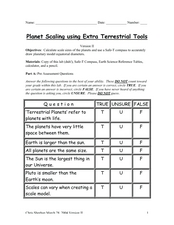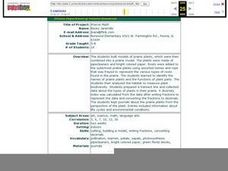Curated OER
Food Math
Students brainstorm healthy food choices. In this health science lesson, students calculate how much of each food group they need daily. They plan a menu based on the "MyPyramid for Kids" food guide.
Curated OER
Applied Science - Science and Math Post Lab
Students utilize a balance scale. For this applied science lesson, students compare the weights of two objects using an elementary balance scale. Students balance the scale with weights to find how heavy an object is.
Curated OER
Applied Science - Science and Math Post-Lab
Students explore optical illusions. In this Applied Science instructional activity, students view optical illusions and record the data of what they see. Students graph the data that they collect.
Curated OER
Wave Math
Students identify the different factors affecting the size and shape of ocean waves. In this math lesson, students calculate wave speed and wavelength given a mathematical formula.
Curated OER
Applied Science - Built Environment Lab
Students evaluate trash. In this Science lesson, students collect and weigh trash from their classrooms. Students categorize the trash and the corresponding weights, recording the information on a data sheet.
Alabama Learning Exchange
Attitude Determines Altitude
A fabulous lesson which combines mathematics with space science. Middle schoolers work in cooperative groups in order to research early astronauts and their accomplishments. They look at a variety of rocket and space shuttle designs, and...
Curated OER
Using Conversion
Instruct youngsters how to convert from one unit of measurement to another. This basic skill is useful in science courses as well as in math courses. Learning check slides are included to help viewers practice solving these types of...
Curated OER
How Big Is That Star?
Aspiring astronomers study stars. They compare stars and explain the relationship between radius, mass, and diameter. By creating a star simulation, they discover how a binary star system's orbit can cause changes in the observed...
Curated OER
Solar Kit Lesson # 12 - Calibration Curve for a Radiation Meter
Scientists need to have mastered algebraic slope-intercept concepts in order for this lesson to be effective. They will measure and graph solar panel output as a function of the amount of radiation striking it, discovering that there is...
Curated OER
Earth Moon Scaling
A wonderful lesson incorporating math and physics skills along with specific details about the planetary bodies. The cross-curricular approach makes for a valid activity to challenge multiple ages and abilities. Your class could work in...
Environmental Protection Agency (EPA)
How Much Water Do You Use?
Incorporate reading strategies, math, research, and the scientific method into one lesson about water conservation. After reading a story about a landlady trying to determine how many people are living in an apartment, learners develop a...
New York Science Teacher
Planet Scaling using Extra Terrestrial Tools
Your class will use a set scale to convert diameters of planets to the model size, the diagram given to expand on the number of planets drawn as concentric circles, and examine the scale that would be needed to fit the larger...
PHET
My Solar System
Orbit diagrams appear to be a work of mathematical art. The simulation helps scholars build their own systems of planets, stars, moons, etc., to observe their orbits. By altering their positions, velocities, and masses, a variety of...
Teach Engineering
Aerogels in Action
Model an oil spill cleanup. An engaging engineering lesson has groups using aerogels to simulate an oil spill cleanup (vegetable oil in water). Along the way, they learn about nanotechnology and hydrophilia/hydrophobia.
Institute of Electrical and Electronics Engineers
Coloring Discrete Structures
What's the least number of colors needed to color a U.S. map? The lesson begins by having pupils view a video clip on continuous and discrete phenomenon, then launches into an activity reminiscent of Zeno's paradox. A separate video...
Scholastic
Study Jams! Identify Outcomes and Make Predictions
Making predictions and identifying possible outcomes are skills that all science pupils should possess. In this video, Mia and Sam discuss the chances of puppies being male or female as an example. The animation is adorable, and will...
Curated OER
Crazy for Cubes: Art and Science
Learners discuss Sol LeWitt and conceptual art, then analyze the differences in expressing a concept through model-based inquiry and aesthetic art criticism. They develop a geometric, scientific, or mathematical concept, then create an...
Curated OER
Graze Like a Cow
Students explore how a cow digests the grass they eat. In this science/math lesson plan, students compare the quality of forage. Additionally, students determine the effects of rangeland health on the production.
Curated OER
Finding Your Center of Gravity: Science, Math, Measurement, Math
Students use bathroom scales, rulers and boards to explore how to measure their own center of gravity.
Curated OER
Prairie Math
Students work together to build models of prairie plants. Using the model, they estimate the height and then measure them using metric and standard units. They write a fraction to represent their part of the whole set and compare and...
Consumers Energy
The Cost of Electricity
How much is your toaster costing you every day? Young environmentalists calculate the monetary costs of household appliances based on their average consumption of wattage.
Oklahoma State University
Hairy Heredity
Young scholars learn that heredity comes down to the flip of a coin with this cross-curricular math and science lesson. Using smiley faces as a model, young scholars toss coins to determine which dominant or recessive...
Curated OER
Genome: The Secret of How Life Works
What do you have in common with a fruit fly? About 60 percent of your DNA. The resource, divided into two units, is intended for grades four to eight and another for high schoolers. Both units include eight lessons covering the...
Florida Institute of Technology
Who Owns the Zebra?
Five women of different ethnicities and living in differently colored houses own different pets, drink different beverages, and work in different professions. Who is who? Solve a logic puzzle that provides 14 clues about connections...
Other popular searches
- Math and Science
- Math and Science Careers
- Integrated Math and Science
- Science/ Math Games
- Math and Science Activities
- Integrating Math and Science
- +Math and Science Careers
- Math and Science Plan
- Math in Science
- Math Science
- Math and Science Lessons
- Math and Forensic Science






















